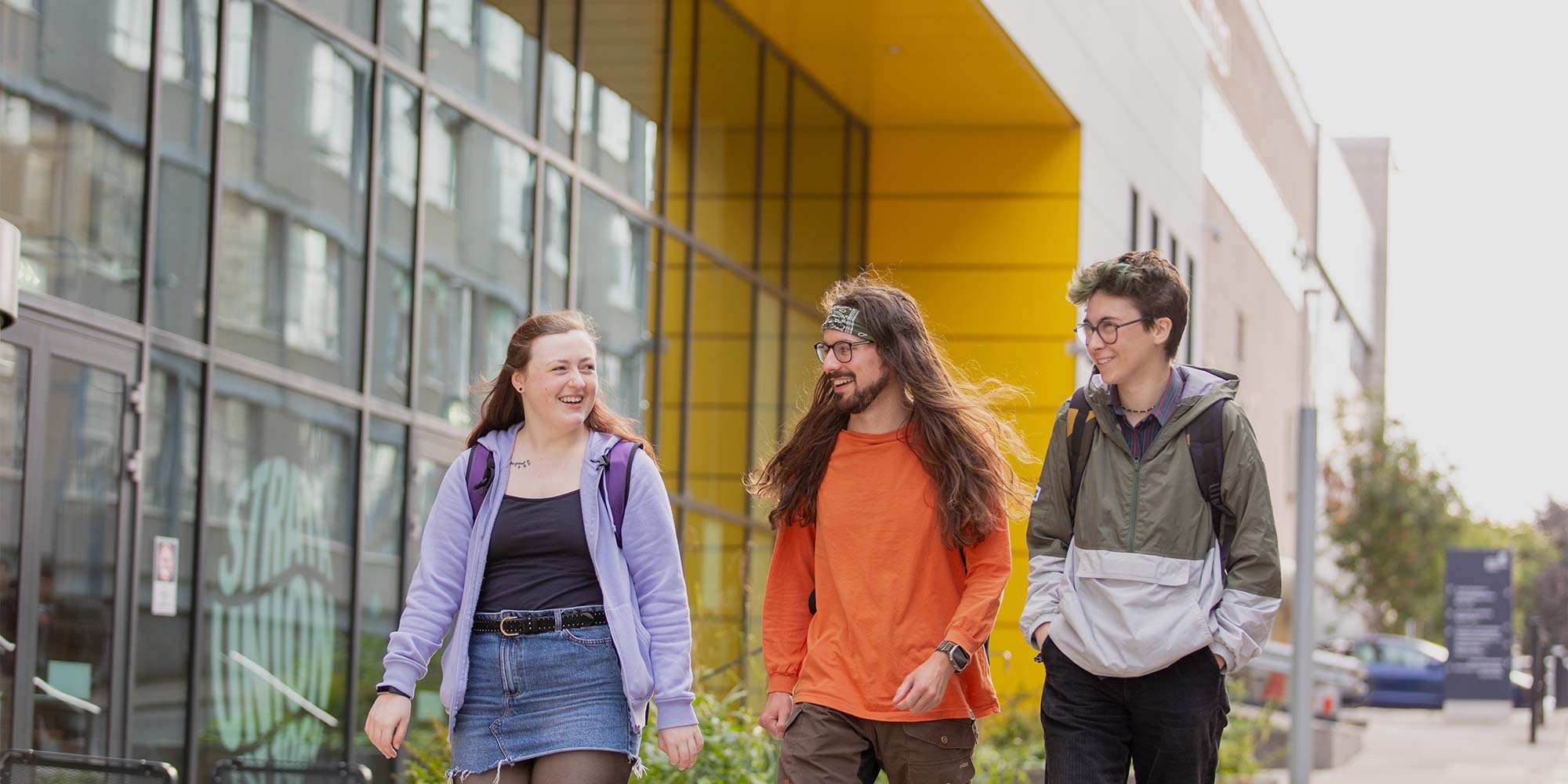MSc Machine Learning & Deep Learning
ApplyKey facts
- Start date: September & January
- Accreditation: Institution of Engineering & Technology
- Study mode and duration: 12 months full-time
Industry Engagement: Competitive internships available
Study with us
This MSc aims to equip students with the industry-relevant skills and expertise to help shape the AI systems of the future. You’ll:
- develop a deep understanding of machine learning principles & deep neutral network architectures, with a focus on cutting edge research & industrial applications
- learn how to design, build & optimise complex machine learning & deep learning systems tailored for use in industry
- explore the architectures, algorithms, & novel engineering & software technologies that underpin today’s most advanced AI systems
- develop practical skills through industry-support research projects addressing current real-world engineering challenges
Why this course?
Machine learning and deep neural networks are at the heart of today’s technological revolution, driving innovation across nearly every sector – from healthcare and finance to robotics, transportation and the creative industries. This MSc is designed to equip you with the applied, industry-relevant expertise and practical skills needed to capitalise in the dynamic and fast-growing intelligent and smart systems domains.
Delivered jointly by the Departments of Electronic & Electrical Engineering (EEE) and Computer & Information Sciences the course offers a truly interdisciplinary learning experience. You’ll benefit from the combined strengths of both departments—gaining insights from leading academics in autonomous and intelligent control, machine learning, deep neural networks, data analytics and software engineering.
Through a blend of theoretical study and hands-on learning, you’ll develop a deep understanding of how intelligent systems are designed, built, and deployed. You’ll also engage with real-world challenges and industry case studies, learning to use the programming languages and engineering tools that drive innovation in today’s products and services.
Whether you're aiming to join a leading technology company, contribute to cutting-edge research, or launch your own AI-driven venture, this course provides the technical foundation, design proficiency expertise and career-ready skills to help you succeed.
"The combination of specialist engineering and computer science classes offered in this MSc ensures graduates possess the technical and practical skills needed to create tomorrow’s innovative and impactful AI systems."
Dr Gaetano di-Caterina
Course Director


What you'll study
You’ll study a selection of taught modules exploring all major aspects of machine learning, intelligent systems and deep neural networks, with a focus on robotics, data science and decision-making technologies. These modules are designed to develop advanced knowledge in these topics, enhanced with the leadership, project management and professional engineering skills sought after by employers.
Check key dates for your MSc and the University academic session.
MSc Project
Upon successful completion of all the required modules, you will progress to the MSc Project, undertaken between May and August. This component involves an in-depth investigation into a core area of machine learning or neural networks design. Projects may be:
- research-based, aligned with current departmental research themes
- industry-based, conducted as an internship with one of the department’s partner companies
While all projects are designed to address real-world engineering challenges, competitive internships offer additional benefits, including:
- site visits
- access to technical data & facilities
- mentorship from an industry professional
This course structure ensures that students graduate with not only academic knowledge but also practical experience and industry insight.
Compulsory modules
Intelligent Sensing & Reasoning through Machine Learning (10 credits)
This module provides the background and skills required to develop autonomous systems based on Machine Learning and Artificial Intelligence. Students will learn the theoretical as well as practical foundations of Data Science (Machine Learning, Deep Learning) for a design and engineering context. Laboratory exercises augment the taught classes to deepen the learning experience. The appreciation of responsible data collection and model training and the responsible design of sustainable solutions is a “golden thread” that runs throughout all lectures.
Neural Networks & Deep Learning (10 credits)
This module provides the background and skills required to develop artificial intelligent systems based on Neural Networks and Deep Learning. Students will learn how to apply the main methods used for machine learning and neural networks and to solve engineering challenges. They will also gain an understanding and appreciation of the breadth of applications, issues and limitations of these tools, and their role in supporting automated decision-making.
Digital Signal Processing Principles (20 credits)
This class covers the fundamentals of discrete time convolution, correlation, transform methods, time frequency signal representation, downsampling/upsampling and digital filters that are core to state of the art machine learning and deep learning architectures. The class has an integral Matlab based laboratory set of tasks that students are required to undertake.
Reasoning for Intelligent Agents (20 credits)
By the end of the module you should understand:
- classifications of problem features for autonomous systems
- common approaches to deliberate reasoning for intelligent agents
- the challenges in integrated planning and execution, and some approaches to solving them
- how to build systems in the Robot Operating System
Machine Learning for Data Analytics (20 credits)
The aim of the class is to:
- understand the aims and fundamental principles of machine learning
- understand a range of the key algorithms and approaches to machine learning
- be able to apply the algorithms covered and interpret the outcomes
- understand the applicability of the algorithms to different types of data and problems along with their strengths and limitations
Deep Learning Theory & Practice (20 credits)
By the end of the module you should be able to:
- understand the challenges in the training of deep neural network and how to overcome the challenges with few shot learning techniques
- understand how to process sequential data with deep neural network and the applications in natural language processing
- develop understanding of the potentials and generalisation of deep neural networks through theoretical analysis
- understand deep generative models and their main approaches
- understand how to build Deep Neural Networks in Python using packages such as Keras/PyTorch and implement such networks
Assignment & Professional Studies (20 credits)
The aim of this class is to provide you with support for your general academic and professional development.
You'll undertake an advanced investigation of an electronic or electrical engineering topic of your choice, to enhance your learning, and develop presentation and communication skills.
Optional modules
You’ll study no more than 20 credits of optional modules. Please note that the below is an indicative list of modules, reflecting the curriculum in the current year. These modules are subject to change, but are likely to include:
Image & Video Processing (20 credits)
This class will provide an introduction to the techniques relevant to digital images and video. This includes techniques both to process images and video and also to efficiently compress and communicate them.
The class will give you a comprehensive understanding of various image and video processing and coding standards. You'll also study some key applications of these standards.
Information Access & Mining (20 credits)
This module will allow you to understand the fundamentals of information access and information mining. The module will cover a range of techniques for extracting information from textual and non-textual resources, modelling the information content of resources, detecting patterns within information resources and making use of these patterns.
MSc Project
Students who successfully pass all required taught compulsory and optional modules will progress to the MSc Project.
MSc Project (60 credits)
The aim of the research project is to provide you with an opportunity to bring your knowledge and skills together and deploy them in a significant practical investigation, using relevant engineering literature, and where relevant, initial experiments or simulations.
Compulsory
The January intake has a fixed curriculum with no optional modules available.
Intelligent Sensing & Reasoning through Machine Learning (10 credits)
This module provides the background and skills required to develop autonomous systems based on Machine Learning and Artificial Intelligence. Students will learn the theoretical as well as practical foundations of Data Science (Machine Learning, Deep Learning) for a design and engineering context. Laboratory exercises augment the taught classes to deepen the learning experience. The appreciation of responsible data collection and model training and the responsible design of sustainable solutions is a “golden thread” that runs throughout all lectures.
Digital Signal Processing Principles (20 credits)
This class covers the fundamentals of discrete time convolution, correlation, transform methods, time frequency signal representation, downsampling/upsampling and digital filters that are core to state of the art machine learning and deep learning architectures. The class has an integral Matlab based laboratory set of tasks that students are required to undertake.
Big Data Technologies (20 credits)
In this module you will learn to:
- understand the fundamentals of Python to enable the use of various big data technologies
- understand how classical statistical techniques are applied in modern data analysis
- understand the potential application of data analysis tools for various problems and appreciate their limitations
- be familiar with a number of different cloud NoSQL systems and their design and implementation, showing how they can achieve efficiency and scalability while also addressing
- design trade-offs and their impacts
- be familiar with the Map-Reduce programming paradigm
Machine Learning for Data Analytics (20 credits)
The aim of the class is to:
- understand the aims and fundamental principles of machine learning
- understand a range of the key algorithms and approaches to machine learning
- be able to apply the algorithms covered and interpret the outcomes
- understand the applicability of the algorithms to different types of data and problems along with their strengths and limitations
Assignment & Professional Studies (20 credits)
The aim of this class is to provide you with support for your general academic and professional development.
You'll undertake an advanced investigation of an electronic or electrical engineering topic of your choice, to enhance your learning, and develop presentation and communication skills.
MSc Project
MSc Project (60 credits)
Students who successfully pass all required taught modules will progress to the MSc Project.
Learning & teaching
The MSc is delivered through a blended learning approach, combining both in-person and online methods to provide a flexible and engaging educational experience. Teaching methods include:
- lectures (in-person & online)
- problem-solving tutorials
- hands-on, project-based laboratory sessions
This approach is designed to equip you with advanced technical expertise, while also developing essential leadership, project management, and professional engineering skills.
Each module typically includes:
- five hours of direct contact time per week
- at least five additional hours of independent study, supported by the University’s virtual learning environment, digital research resources, & library facilities
This structure encourages you to take an active role in your learning and to deepen your understanding through self-directed exploration and research.
Assessment
Each module employs a variety of assessment methods designed to maximise your learning and help you realise your full potential. These methods may include:
- coursework – involving research, design & analysis tasks
- examinations – testing core theoretical knowledge & problem-solving
- lab reports – documenting technical investigations
- presentations – developing the ability to communicate complex ideas clearly & professionally
- group projects – fostering collaboration & innovation skills
- final MSc project/Internships – a substantive piece of independent work demonstrating mastery of a specialist area
Weighting of assessments
Taught modules account for two-thirds (120 credits) of the total assessment, while the MSc Project contributes the remaining one-third (60 credits).
The project is assessed based on:
- the technical quality & contribution of both an interim and final report
- a poster presentation
- your demonstrated initiative, independent thinking & project management skills
This diverse assessment structure ensures that you are not only tested on your academic knowledge, but also on your ability to apply it in real-world and professional contexts.
Professional development & employability
We are committed to helping you build a strong professional network and enhance your employability. In today’s competitive job market, having the right skills, training, and mindset is essential for career success.
To support your development, the MSc offers:
- access to cutting-edge facilities & state-of-the-art laboratories
- guidance from academic experts who are leaders in their fields
- opportunities for industry engagement through internships, guest seminars, careers events & networking sessions
These experiences are designed to help you develop not only technical expertise, but also the professional confidence and connections needed to thrive in the global communications sector.
Facilities
The Department of Electronic & Electrical Engineering has extensive teaching spaces to support your learning and development, with internationally leading research centres, and state-of-the-art facilities dedicated to topics covered within the MSc.
Industrial partnerships with the likes of Leonardo, Comcast (Sky) ORE Catapult, Xilinx, Texas Instruments, Canon Medical Research, MathWorks and Varian Ltd offer insight of the latest technologies and systems in use, and how these help to address real-world challenges.
The Department of Computer & Information Sciences has a range of dedicated computing laboratories, with the latest technologies and software systems. You will benefit from access to these, as well as its internationally-renowned research groups specialising in AI, cyber security, data and information systems, and computation.
Access to the departments’ facilities is designed to support you with your project, offering opportunities to investigate issues such as cloud computing, deep learning tools for medical imaging, how neural networks process sensor data to enable autonomous vehicles or the use of AI systems to optimise and enable precision farming.

Entry requirements
| Academic requirements | Normally a first-class or second-class honours degree (or international equivalent) in electronic or electrical engineering, or computer science. Highly-qualified candidates from other relevant engineering or science-related disciplines may be considered. |
|---|---|
| English language requirements | If English is not your first language, please visit our English language requirements page for full details of the requirements in place before making your application. |
Pre-Masters preparation course
The Pre-Masters Programme is a preparation course held at the University of Strathclyde International Study Centre, for international students (non-UK/Ireland) who do not meet the academic entry requirements for a Masters degree at University of Strathclyde.
Upon successful completion, you'll be able to progress to this degree course at the University of Strathclyde.
Glasgow is Scotland's biggest & most cosmopolitan city
Our campus is based right in the very heart of Glasgow. We're in the city centre, next to the Merchant City, both of which are great locations for sightseeing, shopping and socialising alongside your studies.
Fees & funding
All fees quoted are for full-time courses and per academic year unless stated otherwise.
Fees may be subject to updates to maintain accuracy. Tuition fees will be notified in your offer letter.
All fees are in £ sterling, unless otherwise stated, and may be subject to revision.
Annual revision of fees
Students on programmes of study of more than one year (or studying standalone modules) should be aware that the majority of fees will increase annually. The University will take a range of factors into account, including, but not limited to, UK inflation, changes in delivery costs and changes in Scottish and/or UK Government funding. Changes in fees will be published on the University website in October each year for the following year of study and any annual increase will be capped at a maximum of 10% per year.
| Scotland | £11,900 |
|---|---|
| England, Wales & Northern Ireland | £11,900 |
| Republic of Ireland |
If you are an Irish citizen and have been ordinary resident in the Republic of Ireland for the three years prior to the relevant date, and will be coming to Scotland for Educational purposes only, you will meet the criteria of England, Wales & Northern Ireland fee status. For more information and advice on tuition fee status, you can visit the UKCISA - International student advice and guidance - Scotland: fee status webpage. Find out more about the University of Strathclyde's fee assessments process. |
| International | £31,100 |
| Additional costs | Course materials & costsAll students should expect to pay around £100 for additional course materials and other associated costs. You are not required to buy any specific software licences as all software used in classes will be available locally or remotely on campus machines. Some hardware (microcontrollers, design boards) may be available for loan purposes subject to a refundable deposit. If you choose to purchase these for project work, they cost approximately £10 to £30. Access to department computer labs out of normal working hours is via key card. This costs £20, but is refundable upon return of the card. You are provided with a printing quota for department lecture and tutorial notes, available for use in work conducted in department computer labs. You can buy top-ups if required through University IT Services. Some printing and report binding will be required as part of your course. This is provided by the department’s dedicated Resource Centre. Costs are likely to be about £10 to £20 per year, but will depend on the exact programme and classes taken. International studentsInternational students may have associated visa and immigration costs. Please see student visa guidance for more information. |
| Available scholarships | Take a look at our scholarships search for funding opportunities. |
Please note: the fees shown are annual and may be subject to an increase each year. Find out more about fees.
How can I fund my course?
Scottish postgraduate students
Scottish postgraduate students may be able to apply for support from the Student Awards Agency Scotland (SAAS). The support is in the form of a tuition fee loan and for eligible students, a living cost loan. Find out more about the support and how to apply.
Don’t forget to check our scholarship search for more help with fees and funding.
Students coming from England
Students ordinarily resident in England may be to apply for postgraduate support from Student Finance England. The support is a loan of up to £10,280 which can be used for both tuition fees and living costs. Find out more about the support and how to apply.
Don’t forget to check our scholarship search for more help with fees and funding.
Students coming from Wales
Students ordinarily resident in Wales may be to apply for postgraduate support from Student Finance Wales. The support is a loan of up to £10,280 which can be used for both tuition fees and living costs. Find out more about the support and how to apply.
Don’t forget to check our scholarship search for more help with fees and funding.
Students coming from Northern Ireland
Postgraduate students who are ordinarily resident in Northern Ireland may be able to apply for support from Student Finance Northern Ireland. The support is a tuition fee loan of up to £5,500. Find out more about the support and how to apply.
Don’t forget to check our scholarship search for more help with fees and funding.
International students
We've a large range of scholarships available to help you fund your studies. Check our scholarship search for more help with fees and funding.
Scholarships & funding support
Each year, we offer an extensive range of scholarships for new Home, UK, EU, and international students to help with tuition and living costs. These are offered at university and faculty level, as well as by our industry partners.
Careers
Graduates of this MSc will be equipped with the advanced technical and analytical skills required to thrive in a wide range of industries and roles from healthcare, finance and retail to the environment and transportation.
Potential industry career paths include:
- Machine Learning Engineer – designing and deploying machine learning models for applications in finance, healthcare or retail
- Deep Learning Specialist – developing advanced neural network architectures to support image recognition, natural language processing, and autonomous systems
- AI Software Developer – building intelligent software solutions to support fraud detection, customer risk profiling in the finance sector
- Data Scientist – extracting insights from complex datasets using machine learning techniques, to support medical diagnostics
- AI Product Manager – leading the development of AI-powered products, bridging technical teams and business strategy
- Automation Engineer – optimising industrial processing with AL to deliver enhanced performance and cost savings
Our graduates have capitalised upon opportunities across a range of sectors, progressing to well-paid jobs with the likes of Natwest, IMEC, Craft Prospect, XCM and Siemens. They have also capitalised upon opportunities within:
- technology companies
- PhD & academic research roles
- government agencies
- healthcare sector
What could I earn?*
| Role | Potential earnings |
|---|---|
| Automation Engineer |
You can expect to earn an average salary of £41,260 in the UK, increasing to £52,800 with experience |
| Robotics Engineer |
Entry level positions in the UK start at round £37,800 per year, rising to an average £46,000. Salaries for more senior roles are about £61,000 |
| Applications Developer |
As a new graduate, you can expect to start on around £40,000, rising to an average salary of £47,500 per year. This could increase to £62,500 for the most experienced workers |
| Data Scientist |
Initial positions start at £40,000 per year in the UK, but you can expect this to increase up to £75,000 for the most senior roles |
| Systems Engineer |
Average earnings for a systems engineer in the UK is £40,200 per year, rising to £52,000 for senior roles |
Information is intended only as a guide. Salary detail acquired from Talent.com, June 2025.

The world of AI is rapidly developing, opening up new and exciting job prospects across a range of industries. The opportunity to gain advanced knowledge about this, and capitalise upon the opportunities it offered, was the reason I chose this MSc.
MSc Machine Learning & Deep Learning
Apply
During the application process, you're required to upload the following supporting documents. If these are not provided, we'll not be able to process your application:
- certified individual semester mark sheets/academic transcript showing subjects taken and grades achieved for all qualifications
- if still studying, provide individual semester mark sheets to date
- provide evidence of strong mathematical skills, and a basic understanding and knowledge of Fourier Analysis and Signals and Systems
- demonstrate fundamental knowledge and practical experience of computer programming, providing examples of types of languages used and in what capacity
- certified degree certificate for all qualifications
- if still studying, provide this after completing the qualification
- provide evidence of suitable English language proficiency if English is not your first language, or you're not from a “UKVI recognised "Majority English Speaking" country”; check the University’s language requirements
- if you have been out of full-time education for over two years, provide a CV, detailing employment history, organisations worked for and a brief description of roles and responsibilities
- a copy of your passport containing your photo and passport number
- a copy of your sponsor letter/scholarship award (if appropriate)
- names, job titles and email addresses for two nominated referees
Start date: Sep 2025
Machine Learning and Deep Learning
Start date: Jan 2026
Machine Learning and Deep Learning (January intake)

